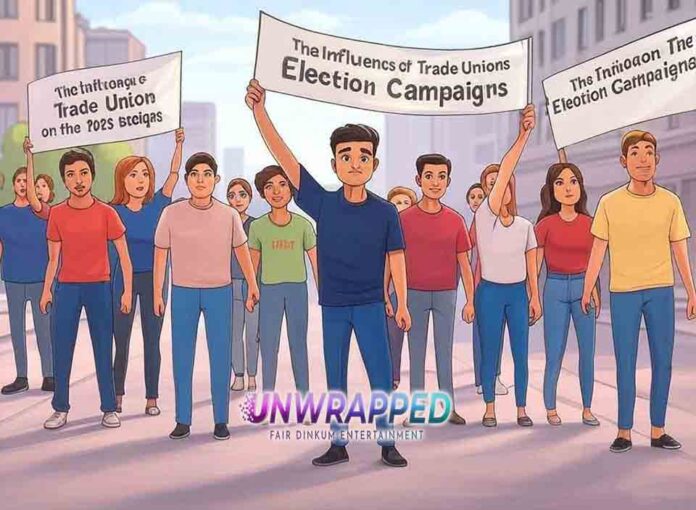Trade unions have long played a significant role in shaping Australia’s political landscape. As the 2025 Federal Election approaches, their influence is as potent as ever, with unions advocating for workers’ rights, fair pay, and social equity while influencing party platforms and campaign strategies.
This article delves into the history, strategies, and impact of trade unions on the 2025 election, examining their partnerships with political parties, their advocacy efforts, and the issues they are prioritizing this election cycle.
The History of Trade Unions in Australian Politics
Trade unions have been a cornerstone of Australia’s labor movement for over a century, shaping policies that protect workers and promote fair labor practices. Key historical milestones include:
- The eight-hour workday movement in the 19th century.
- The establishment of fair work laws.
- Advocacy for workplace safety, superannuation, and equal pay.
(Learn more: Australian Council of Trade Unions (ACTU))
Why Trade Unions Are Crucial in 2025
1. Championing Workers’ Rights
Unions represent millions of Australian workers across industries, ensuring their concerns are addressed in political platforms. Their advocacy influences key areas like:
- Minimum wage increases
- Job security in a post-pandemic economy
- Health and safety regulations
2. A Powerful Political Force
Unions wield significant political influence, particularly through their alignment with the Australian Labor Party (ALP). The ACTU and affiliated unions often play a pivotal role in shaping the ALP’s policies and campaign strategies.
3. Grassroots Mobilization
Trade unions excel at grassroots activism, mobilizing members to campaign, volunteer, and vote. Their ability to engage directly with communities makes them an indispensable asset during election campaigns.
(Explore: Fair Work Commission)
Key Issues Trade Unions Are Advocating For in 2025
1. Wage Growth
After a decade of stagnant wage growth, unions are pushing for policies that ensure:
- Regular wage increases in line with inflation.
- Improved conditions for casual and gig economy workers.
(Read more: Wage Growth in Australia)
2. Job Security
With the rise of casualization and insecure work, unions are advocating for:
- Stronger protections for contract workers.
- Legislation to curb exploitative practices in the gig economy.
3. Gender Pay Equity
Unions are calling for greater efforts to close the gender pay gap through:
- Mandatory pay transparency.
- Stronger enforcement of workplace discrimination laws.
(Learn more: Workplace Gender Equality Agency)
4. Climate Transition and Jobs
Unions are aligning with climate-focused policies to ensure a just transition for workers in fossil fuel industries, advocating for:
- Investments in renewable energy.
- Retraining programs for workers in transitioning industries.
(Explore: Climate Council)
The Role of Trade Unions in Political Campaigns
1. Policy Development
Unions work closely with the ALP and other parties to shape policies that benefit workers. Their input ensures labor-friendly platforms, including:
- Expanded parental leave policies.
- Enhanced workplace protections.
2. Financial Support
Unions provide significant funding to political campaigns, particularly for the ALP, enabling widespread advertising and outreach efforts.
3. Member Mobilization
Unions leverage their membership bases to:
- Conduct door-to-door campaigns.
- Organize rallies and events.
- Encourage voter turnout, particularly in marginal seats.
(Read more: Electoral Commission of Australia)
Challenges Facing Trade Unions in 2025
1. Declining Membership
Union membership in Australia has declined in recent decades, from over 40% in the 1980s to around 14% today. This decline affects their financial and political influence.
2. Perceptions of Partisanship
Unions’ close alignment with the ALP sometimes alienates non-Labor voters, limiting their reach.
3. Adapting to a Changing Workforce
The rise of remote work, automation, and gig economy jobs requires unions to adapt their strategies to remain relevant.
(Read more: Australian Bureau of Statistics: Union Membership Trends)
Trade Unions’ Influence on Key Political Parties
1. Australian Labor Party (ALP)
The ALP has deep historical ties to trade unions, with many of its policies reflecting union priorities. Key focuses include:
- Increasing the minimum wage.
- Protecting workers in transitioning industries.
- Expanding workplace rights for casual and part-time employees.
(Explore: Labor Party Policies)
2. Coalition
The Coalition often opposes union-driven reforms, advocating for a business-friendly approach. Their policies typically focus on:
- Reducing red tape for businesses.
- Opposing union-driven wage increases that they argue could harm economic growth.
(Explore: Liberal Party Policies)
3. The Greens
The Greens align with unions on climate transition and worker protections. Their policies include:
- Supporting renewable energy jobs.
- Advocating for universal basic income and stronger workplace rights.
(Explore: The Greens Policies)
Predictions for Trade Union Impact in 2025
1. A Strong Voice in Policy Debates
Unions are expected to push hard for wage increases and job security reforms, making these central election issues.
2. Influence in Marginal Seats
Unions will likely focus their efforts on swinging marginal seats, where grassroots mobilization can have the most significant impact.
3. Climate and Jobs
Unions advocating for a just transition in the energy sector will influence debates around climate policies and renewable energy investments.
(Learn more: Just Transition Framework)
How Voters Can Engage with Trade Union Advocacy
1. Stay Informed
Follow union campaigns and advocacy efforts to understand their positions on key issues.
2. Join a Union
If you’re a worker, consider joining a union to ensure your voice is represented in policy debates.
3. Support Grassroots Efforts
Engage with union-led community events and campaigns to amplify their impact.
(Explore: ACTU Campaigns)
Conclusion: A Key Player in the 2025 Election
Trade unions remain a powerful force in Australian politics, advocating for workers’ rights and influencing policies that shape the nation’s future. As the 2025 election unfolds, their efforts will be pivotal in driving debates around wages, job security, and climate action.
What role do you think trade unions should play in shaping Australia’s future? Share your thoughts in the comments or join the conversation online.
External Resources
See Also: Youth Engagement in the 2025 Election: Trends and Predictions











